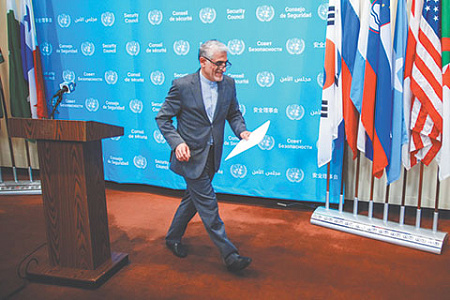
Iran is bracing for a full-blown confrontation after a UN Security Council vote set the stage for the potential return of all international sanctions, which were lifted under the 2015 nuclear deal (JCPOA). In a swift and defiant response, Tehran announced it was halting cooperation with the International Atomic Energy Agency (IAEA) and issued stark warnings, signaling a return to a ‘fortress’ mentality and its readiness to defend its national security “to the last breath.”
The Iranian Armed Forces declared they are more prepared than ever, stating they will “stand like a mountain… protecting the security, national interests, and establishment of the Islamic Republic.” The powerful Islamic Revolutionary Guard Corps (IRGC) went further, warning of a potential new 12-day war and promising that “any new miscalculation and aggression by the enemy will lead to another deadly and instructive response,” vowing to seize the initiative and inflict heavy losses in any future conflict.
This dramatic escalation was triggered by the failure of a resolution at the UN Security Council on September 19 that would have permanently lifted arms restrictions on Tehran. Nine members, including the United States, United Kingdom, and France, voted against the measure, while Russia and China were among the four who supported it. With the resolution’s failure, the mechanism for a full ‘snapback’ of UN sanctions could be triggered, potentially taking effect after September 28. Despite the tensions, a UN source indicated that dialogue could resume, possibly during the UN General Assembly’s high-level week, where Iranian President Masoud Pezeshkian is scheduled to attend and meet with world leaders and UN Secretary-General António Guterres.
As its first retaliatory measure, Tehran is suspending cooperation with the IAEA, a fragile partnership that had only recently been restored. Iran’s Supreme National Security Council announced the move was a direct result of actions by European nations—France, Germany, and the UK—who initiated the sanctions snapback process. This decision will bar IAEA inspectors from visiting Iranian nuclear sites, a critical blow to the agency’s recent efforts to clarify the status of highly enriched uranium believed to be at sites targeted in previous conflicts. Critics of Tehran fear this material could be used to develop a nuclear weapon.
Inside Iran, the political response has been a mix of defiance and hawkish calls for escalation. President Pezeshkian asserted that international pressure would not stop the country’s research activities, vowing that its scientists would rebuild and improve facilities like the one targeted in Natanz. More hardline voices in the parliament are pushing for a more radical response. Lawmaker Mannan Raisi questioned why Iran should be denied nuclear weapons in a “jungle of lawlessness where the only rule is brute force,” suggesting a withdrawal from the Nuclear Non-Proliferation Treaty (NPT). His colleague, Ahmad Bakhshaish Ardestani, was more direct, arguing that Tehran should begin developing its own nuclear weapons as quickly as possible.
Beyond immediate retaliation, Iran is also considering long-term diplomatic strategies to counter Western pressure. Parliamentarian Abbas Goudarzi announced that lawmakers are now working on a project to create a special international alliance of nations under Western sanctions. The initiative aims to foster greater cooperation and build a united front among states facing similar international restrictions, signaling a strategic effort to build a parallel economic and political bloc.
